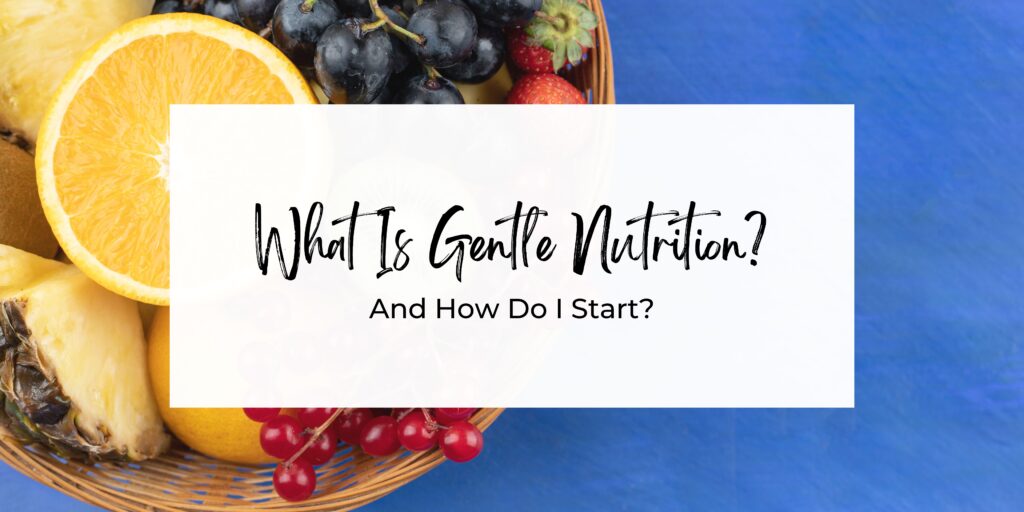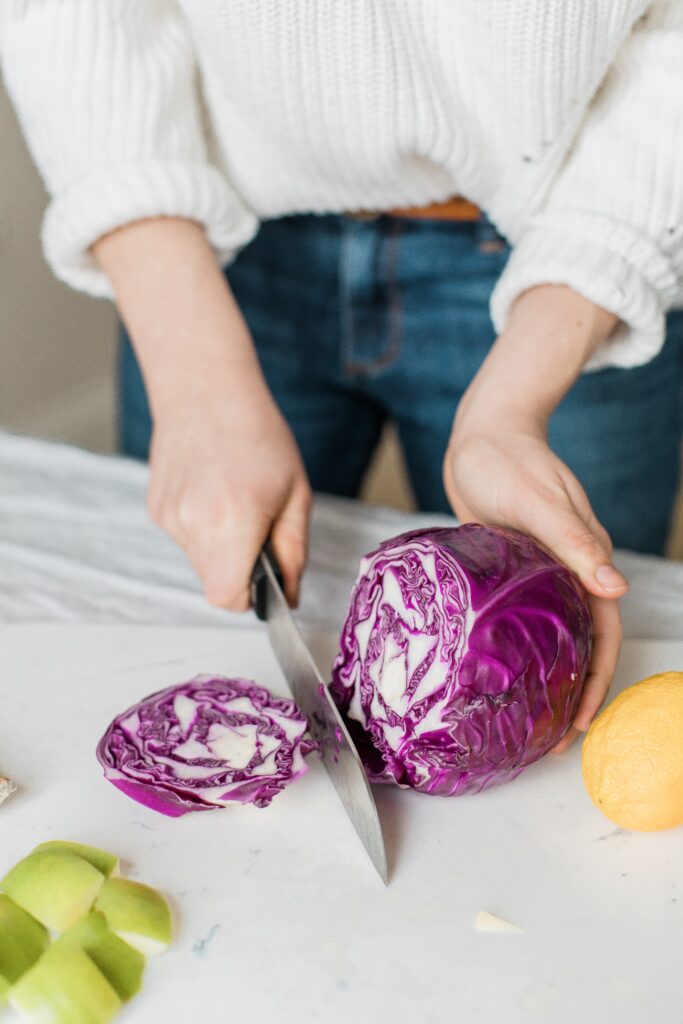
“Honor Your Health with Gentle Nutrition” is the tenth principle in the framework of Intuitive Eating, a non-diet approach to nutrition. In this article, we’re breaking down what gentle nutrition is, the benefits you may gain from it, and what it means to practice it.
Intuitive eating, an adaptive alternative to dieting, has gained in popularity over the last few years. As a non-diet dietitian, I believe more awareness to this evidence-based approach is amazing! After all, intuitive eating has been associated with many positive psychological and physical benefits.
But, more awareness to this eating framework has also brought forward many misconceptions. And I get it. Intuitive eating seems almost radical when compared to traditional dieting. It allows more food and body autonomy, something that is not generally allowed when a person diets. One common sentiment I hear is that “intuitive eating means eating whatever you want, and not thinking about overall health.”
Not the case, at all!
It is true that intuitive eating seeks to honor a person’s food preferences in a compassionate and flexible way, so all foods can exist without associated guilt or shame. However, the Intuitive Eating framework also strives to help someone learn to eat in a way that promotes good physical and emotional health outcomes.
Pretty cool, right? Here’s where gentle nutrition shines.
What is “Gentle Nutrition?”
Intuitive Eating was created in the 1990s by dietitians Evelyn Tribole and Elyse Resch. The following quote, taken from their book The Intuitive Eating Workbook, describes gentle nutrition like this:
“Make food choices that honor your health and taste buds while making you feel well. Remember that you don’t have to eat a perfect diet to be healthy. You will not suddenly get a nutrient deficiency based on one snack, one meal, or one day. It’s what you eat consistently over time that matters – progress not perfection is what counts.“
As a non-diet dietitian, I like to think of gentle nutrition as a place that exists in the intersection between our nutrition knowledge and our body’s desires. It takes into account both our internal cravings as well as the external messages we have learned about honoring our health.
This works by first discarding any unnecessary and rigid rules around food and exercise. The first nine principles of intuitive eating are dedicated to doing just that – and it can be so helpful to work through those first! That’s how a person can truly embrace the benefits of nutrition while also maintaining a more positive relationship with food and their body.
How Is Gentle Nutrition Different Than A Diet?
A diet, or “diet culture,” generally involves eating in a restrictive way with an end goal of manipulating a body’s size, or making a person thinner. Diets often require giving up specific foods or food groups to achieve a specific way of eating.
An example of a thought influenced by diet culture could be:
“Even though I’m in the mood for pizza, I’ll have to stick to my low-calorie and low-carbohydrate diet and only eat a grilled chicken breast with a salad and non-fat salad dressing.”
Gentle nutrition, on the other hand, encourages food choices that support your mind-body connection. It enables you to make choices that help you feel good physically, fuel you energetically, and satisfy you mentally.
An example of a thought influenced by gentle nutrition could be:
“Pizza sounds really good right now. It’s been a while since I last ate and I’m pretty hungry, so I’d love to eat a couple of slices. I know I feel better when I pair some veggies with pizza, so I’ll also make a quick salad to go with the pizza. I can add some roasted chickpeas for a little more protein and flavor, and I’ll add my favorite dressing for extra satiety.“
See the difference? The first scenario is driven by external cues and rules, with a main goal of external physical changes. Gentle nutrition allows us to apply the fundamentals of nutrition science in a non-obsessive way, while honoring our internal cues and desires.
What Are The Benefits Of Gentle Nutrition?
Research proves there are several physical and psychological benefits of embracing a gentler version of nutrition, including:
- reductions in stress, anxiety, and depression
- improved blood pressure and HDL/LDL cholesterol balance
- more variety in eating choices
- increased consumption of fruits and vegetables
- decreased emotional eating and binge eating
- improved quality of life and life enjoyment
So, How Do I Get Started With Gentle Nutrition?
If you’re ready to embrace gentle nutrition, I’d suggest you first consider your own thoughts about food and eating. Do you have fear about eating any foods? Do you notice obsessive thoughts about any foods throughout the day? Are you eating to change your body size, or to improve your overall wellbeing? Recording your own observations in a journal can be useful to identify patterns, and then you can decide if you’d like to change these.
It can also be helpful to become familiar with the concepts of intuitive eating. Working through those first nine principles may help you create more respect for your body and allow an expanded view of nutrition to evolve.
If you’d like a resource, check out my free 5-step beginner’s guide to intuitive eating for support and guidance.
The Bottom Line On Gentle Nutrition In Intuitive Eating
When we utilize gentle nutrition, food becomes a tool to support our physical, emotional, and mental needs. We can consistently provide ourselves care, and navigate life in a realistic and thoughtful way.
Gentle nutrition might be right for you if you’d like to start living the life you’re striving for without stress!
Want support getting started? A certified intuitive eating counselor, like myself, can provide guidance and structure so you can have more ease and confidence during this process. Set up a free 15-minute inquiry call with me to see if individualized nutrition counseling and coaching is a good fit for you.




